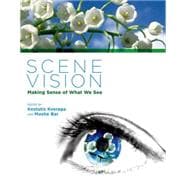For many years, researchers have studied visual recognition with objects—single, clean, clear, and isolated objects, presented to subjects at the center of the screen. In our real environment, however, objects do not appear so neatly. Our visual world is a stimulating scenery mess; fragments, colors, occlusions, motions, eye movements, context, and distraction all affect perception. In this volume, pioneering researchers address the visual cognition of scenes from neuroimaging, psychology, modeling, electrophysiology, and computer vision perspectives.
Building on past research—and accepting the challenge of applying what we have learned from the study of object recognition to the visual cognition of scenes—these leading scholars consider issues of spatial vision, context, rapid perception, emotion, attention, memory, and the neural mechanisms underlying scene representation. Taken together, their contributions offer a snapshot of our current knowledge of how we understand scenes and the visual world around us.
Contributors
Elissa M. Aminoff, Moshe Bar, Margaret Bradley, Daniel I. Brooks, Marvin M. Chun, Ritendra Datta, Russell A. Epstein, Michèle Fabre-Thorpe, Elena Fedorovskaya, Jack L. Gallant, Helene Intraub, Dhiraj Joshi, Kestutis Kveraga, Peter J. Lang, Jia Li Xin Lu, Jiebo Luo, Quang-Tuan Luong, George L. Malcolm, Shahin Nasr, Soojin Park, Mary C. Potter, Reza Rajimehr, Dean Sabatinelli, Philippe G. Schyns, David L. Sheinberg, Heida Maria Sigurdardottir, Dustin Stansbury, Simon Thorpe, Roger Tootell, James Z. Wang








